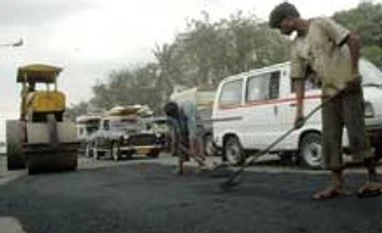The proposal is to allow developers of existing and coming projects to sell or transfer their stake in the special purpose vehicle formed for the project, without having to create a new SPV. “The finance ministry has approved the proposal and it will come into effect immediately,” said a senior official at the ministry.
According to the proposal, developers of public-private partnership (PPP) projects awarded or to be awarded on the build-operate-transfer (BOT) mode will, when wanting to exit, have to make a representation to the lenders. Upon approval, they will be charged a penalty. This will be subject to a cap of one per cent of the total project cost, the amended policy says.
Also Read
Road projects are undertaken through SPVs comprising the concessionaire (operator) and the highways authority. The projects are usually awarded for 20-25 years. The construction is done in three years and the tolling period starts once the project is built. The previous policy did not allow transfer of equity but only substitution of a concessionaire, following which a new vehicle had to be formed. The policy had no takers, as the new vehicle did not get the perquisites offered to the original one, including a tax holiday.
Road developers are sceptical. “The valuation of road projects will be in the lower side, so even if a concessionaire wants to exit a project, he might not get the right valuation. The new policy is also lender-oriented, since the concessionaire has to seek lenders’ permission,” said B Murali, director-general, National Highway Builders Federation.
“This was the original recommendation NHAI had put forward. But the government formulated the new policy that required the creation of a new SPV, once a concessionaire was substituted. There were a host of concerns, including the issue of tax holiday,” a senior NHAI official said.
Road developers have been long demanding a change in the exit policy, maintaining this could free up equity for future projects.
They are, however, sceptical if what has been approved will change things much. “In the current climate, the valuation of road projects will be in the lower side, so even if a concessionaire wants to exit a project, he might not get the right valuation. The new policy is also lender-oriented, since the concessionaire has to seek lenders’ permission” said B Murali, Director General, National Highway Builders Federation.
The relevant circular says, “The new policy will be extended to all ongoing projects where financial closure has been achieved. Completed two-four-six laning projects are also eligible and so are all future BOT projects. In view of the difficulties faced by the concessionaires in PPP projects, the government has decided to permit the substitution of existing concessionaires.”
Private sector developers have been staying away from road projects due to inadequate funding and land acquisition concerns, forcing the government to scrap awards on PPP this year. The ministry has now decided to award projects on the government-funded route.
A plan to reschedule the premiums the companies owe NHAI is uncertain. Road developers have been seeking this to help revive investments. A committee headed by C Rangarajan (the Prime Minister’s economic advisory council head) has recommended on the matter but builders say the changes haven’t gone far enough. The recommendations are being processed.
- NHAI made a proposal to the roads ministry 18 months ago
- Roads ministry notified exit policy substituting developer asked to create new special purpose vehicle
- NHAI and developers concerned over tax holiday not being extended to the new SPV
- New policy allows developers to exit projects, and buy into the existing SPV
- Lenders and NHAI’s approval needed before move
- Applies to all existing and new two-four-six lane highway projects
)